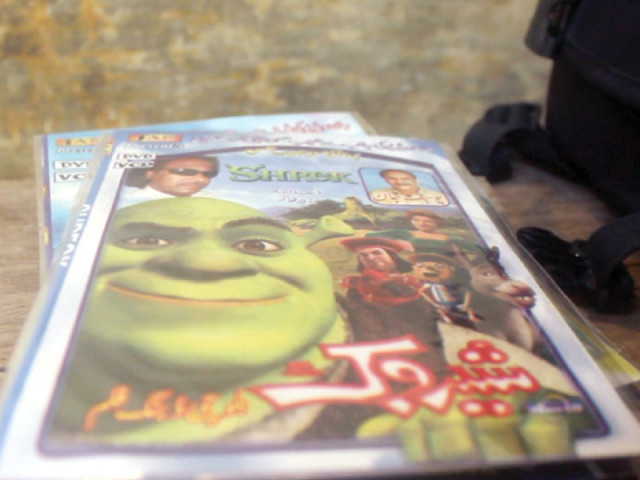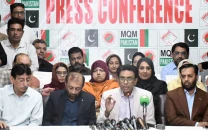From Garfield to Shrek, movie characters find a new Baloch identity in Lyari
Studio uses male voice over artists to record female characters as well.

A group of movie buffs in Lyari have set up a small-scale studio where they dub popular Hollywood and Bollywood movies into Balochi. Shrek was one of their popular works, which became ‘Shiruk’ after the adaptation. Voice-over artist Ghulam Haider dubs female roles. PHOTO: EXPRESS
Shrek transforms into Shiruk, Stuart Little is Mr Shambe and Garfield becomes Pishuk - popular Hollywood and Bollywood movies find a new identity, voice and sometimes even a fresh plot, in the tiny, crumbling room that houses Jan Studios in Jhatpat Market, Lyari.
Posters of popular flicks with their new Baloch names adorn the small room that barely accommodates 10 people. Started 15 years ago by a bunch of friends and movie enthusiasts, the studio is a union of passion and business. According to the studio’s producer and financier Habib Hassan, the venture started as an accident in the late 1990s when they dubbed a small part of the popular film Stuart Little and sold it in the market. The response was overwhelming and it indicated that there was a huge market for Baloch arts.
Watch a related video on Vimeo here.
“Balochi language has no representation in the mainstream media,” admits Hassan. “We don’t have any films or dramas. So this is our way of keeping the language alive for the newer generation.”
With a small crew of permanent employees and multiple volunteers from the area, the studio has dubbed over 100 English and Indian movies into Balochi. The movies are picked out based on their popularity in the market by Hassan, with children’s movies having the biggest fan base.

Production begins with the minimal equipment - a run-down, dusty computer and an ordinary mic. The director and scriptwriter, Zubair Thakur pens out a fresh script in Balochi, voice over artists are called in, followed by a few sessions of ardent editing. The entire process usually takes up anywhere between 10 and15 days, and costs approximately Rs20,000 per film.
Even folk Balochi songs are juxtaposed onto the tracks in the film and sometimes the plot is altered according to local realities in order to make them more relevant to the audience. For instance, Shaolin Soccer (a comedy film from Hong Kong) was re-named as “Young Lyari” and the plot was re-worked to highlight the plight of football players in Lyari and their broken dreams.
Many like Thakur, worked as day labourers prior to joining the studio. But the love of films and singing forced them to quit their jobs and become a part of this venture. Despite the limited resources and monetary challenges, there has been no looking back.
While Thakur can effortlessly mimic anyone from Amrish Puri to Amitabh, another voice-over artist Ghulam Haider dubs the women’s roles. With his rare effeminate voice that can mimic artists, such as Noor Jehan and Lata Mangeshkar with equal ease, Haider eliminates the need for any female voice over artists. “Getting women to do these kind of jobs is difficult and looked down upon in our society,” explains Hassan.
Once a movie is complete, it is sold at wholesale and retail rates in the local market. Each DVD is sold for Rs 30 or Rs40 in Pakistan, but business has suffered due to the airing of films by cable operators, says Hassan. Along with a budding local market, these films also enjoy an audience abroad in countries, such as Muscat, Dubai, parts of UK and especially Iran.

“Due to copyright issues, we cannot officially sell these films overseas but people visiting Pakistan take a huge number of DVDs with them, just like Multani halwa, so we get to maintain our overseas demand,” Hassan admits with a chuckle.
Thakur, Haider and all their employees dream of creative freedom that is not restrained by monetary concerns. They wish to partner with a studio where they can work with modern recording equipment, editing systems and a team of writers.
“There is so much talent around that we can’t utilise because we cannot afford to pay them. If only people could realise the quality of the work being done here, this studio has the potential of becoming really big,” Hassan says remorsefully.
Published in The Express Tribune, March 3rd, 2013.



















COMMENTS
Comments are moderated and generally will be posted if they are on-topic and not abusive.
For more information, please see our Comments FAQ